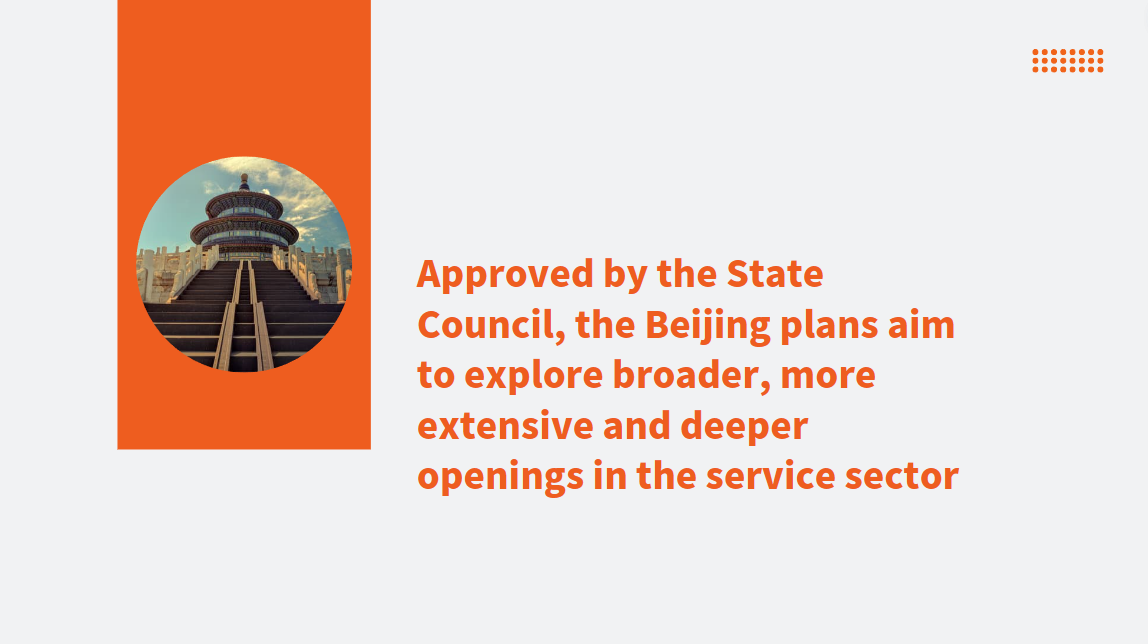Services to open up more for investment
The Chinese government plans to gradually extend practical opening-up measures related to the services sector from Beijing to other provinces and cities, further expanding market access for foreign investment in areas like finance, telecommunication and healthcare, said senior officials on Friday.
The State Council, the country's Cabinet, approved a work plan last week to support Beijing in accelerating the development of an integrated national demonstration zone for opening up the services sector, according to information released by the Ministry of Commerce on Thursday.
Speaking at a news conference in Beijing, Ling Ji, vice-minister of commerce and deputy China international trade representative, said that based on the practices in the Beijing demonstration zone, the Commerce Ministry will work with other government branches to conduct a comprehensive review and evaluation of the docking efforts.
"This will serve as the basis for introducing a new round of pilot initiatives in other provinces and cities," said Ling.
The work plan proposes over 170 pilot tasks in initiatives such as deepening reform and opening-up in key sectors of the services sector, exploring rules and regulations for emerging business forms and optimizing institutional trade and investment arrangements.
For instance, Beijing will lift foreign ownership restrictions on value-added telecommunications services such as information and internet access services. The city will consider further expanding the opening up of value-added telecommunications services at an appropriate time.
In the areas of healthcare and medical services, the national capital will support qualified foreign doctors in opening clinics within its municipality region. In the professional services sector, qualified foreign individuals are allowed to engage in securities investment consulting and futures trading consultancy businesses.
Sima Hong, Beijing's vice-mayor, said the municipal government will review and update local regulatory rules inconsistent with the negative list on foreign investment. Additionally, efforts will be made to reduce trade costs and barriers, enhance cross-border trade supervision services, and improve the mobility and convenience of cross-border funding.
A negative list refers to specific areas of industry where foreign investors are not allowed to operate. They can operate in areas not appearing on the list.
Sima said that Beijing will support venture capital firms and equity investment institutions to carry out market-oriented cooperation with various financial institutions. The city will also provide financing services to target businesses in accordance with the country's laws and regulations.
Through China's comprehensive pilot programs for opening up the services sector initiated in 2015, the 11 selected cities and provinces, including Tianjin, Shanghai, Chongqing and Hainan province, have progressively facilitated the opening of 13 key areas like science and technology development, telecommunications, finance, culture and tourism, said Zhu Bing, director of the foreign investment administration department at the Ministry of Commerce.
"They have fostered various new growth formats, including digital and green economies," said Zhu, adding that a number of foreign businesses have established themselves and grown in these places. They include China's first aircraft maintenance company with foreign controlling stake, foreign-controlled securities company and wholly foreign-owned currency brokerage firm.
To advance opening-up in the financial services sector, China granted the bankcard clearing license to the New York-based MasterCard Inc's joint venture in the country earlier this month, bringing the total number of foreign players in its bankcard clearing sector to two, including American Express.
These moves showcase the country's commitment to opening-up, which is conducive to fostering effective competition in the services sector, said Li Jun, director of the Institute of International Trade in Services, part of the Beijing-based Chinese Academy of International Trade and Economic Cooperation.






















































First, please LoginComment After ~